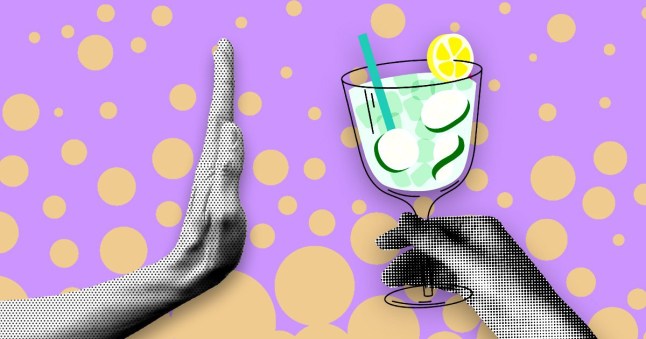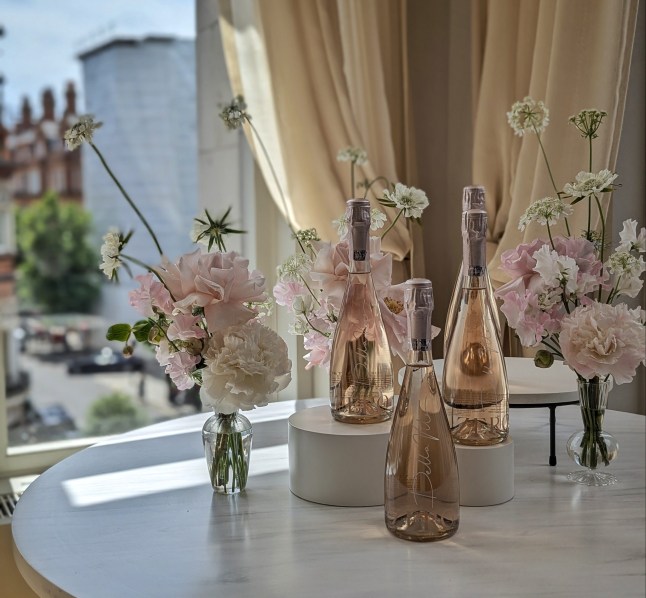
Would you ditch the booze – and the horrible hangover that often comes along with it? We spoke to several teetotallers to find out what’s so good about being alcohol-free.
It’s fair to say that alcohol fuels a lot of activities in life, particularly in the summer season.
However, while alcohol can certainly lead to a fun time, one too many glasses of wine or Aperol spritz can also result in some questionable behaviour and feeling less than fabulous the next day.
Sadie Bass, an influencer from Bristol, 28, speaks out about her newfound sobriety to her 82.3k followers on her Instagram channel.
Choosing to go sober mainly for her mental health, Sadie said she was ‘fed up of feeling terrible and low all week, only to feel better by Friday and do it all over again.’
On her wildest night, the content creator ended up dislocating her knee while partying in a bar in Soho, London.
Whether you’re looking to sack off the sauce just for summer or go completely teetotal, it can be a daunting journey to embark upon.
Learning to navigate summer terrace visits and barbecues can seem like a challenge, with many tempting opportunites about.
According to Sadie, the beginning wasn’t easy – particularly in social situations as there tends to be the constant need to explain why you’re not drinking.
However she added: ‘As time goes on, it gets easier and more worth it – when you start seeing the benefits.
‘I have so much free time now I’m not wasting days hungover and I have a lot more hobbies than when I was drinking.’
Breaking habits isn’t easy though and even Sadie admits that she sometimes misses drinking – as well as the feeling of excitement before a night out and ‘how it stops you overthinking.’
But she maintains that she does not miss the low feeling afterwards.
Sadie isn’t the only one who’s exploring sobriety. Laura Bartlett, Leeds-based founder and editor of House of Coco magazine, 37, started her sober journey as alcohol was having a negative impact on her life.
Having now been sober for almost two years, Laura maintains that it’s the best decision she ever made and that ‘it’s been life changing in ways I never could have dreamed of before.’
She goes on to say that she actually doesn’t miss alcohol and, in fact, has had her mum join her on her sober journey, in support.
Speaking of booze, Laura notes: ‘I haven’t craved it, wanted it or missed it since the day I decided to quit,’ and adds that ‘most of my friends choose to go sober when they’re with me, as most people are keen to drink less anyway.’
Aliza Marogy, founder of clinical supplement brand Inessa, explains how drinking too much alcohol can be a huge hazard to your health.
‘Heavy alcohol use decreases the secretion of digestive enzymes produced by the pancreas, that are required to extract nutrients from food. It can also damage the digestive tract, which may further impair digestion and nutrient absorption,’ she says.
She goes on to say that excessive alcohol intake can lead to a deficiency of any nutrient – but commonly depletes B-vitamins, which are required to produce enzymes that help the liver to metabolise alcohol; vitamin C; potassium; zinc; calcium and magnesium.
‘This can cause electrolyte imbalances, and cause fatigue,’ says Aliza. ‘But if it’s a regular habit, depletion of these nutrients can have more serious health consequences – affecting mental health and brain function, hormonal balance, the immune system and much more.’
Even the Delevingne sisters are the latest to embrace the zero-alcohol trend – with the launch of their new range, Della Vite Zero.
Having embarked on her own journey of sobriety, Cara Delevingne shared her and her sisters’ enjoyment of the ritual of reuniting over ‘a glass of something’.
‘Nearly two years ago, when I got sober, I thought I probably won’t go out as much and, to be honest, I went out way more than before – which is great apart from when you go out, you drink a hell of lot of sugar and I would wake up in the morning with a terrible headache!’

The model and actress went on to say she questioned her reasons for sobriety, wanting ‘to be healthy and happy,’ so the core ethos of the brand’s venture into non-alcoholic sparkling wine was to ‘make something that was beautiful-tasting, great quality, low sugar and low calories.’
It’s not just a Sober Girl Summer, either, with Harry Jones, a marketing manager from Manchester, 27, stepping up for the sober kings out there, too.
On his decision to quit drinking, Harry says: ‘I came to the realisation a few years ago that I didn’t actually like drinking.
‘I’m actually quite an anxious guy and I think I drank mainly to help me relax more when socialising in large groups.’
‘One Sunday morning, I woke up and just decided it wasn’t fun anymore. My house was a mess, I had no money left in my bank account and my anxiety was even worse because I was hungover.’
Another one to never look back since ditching the booze, Harry says he knew he could ‘do it’ after a brief sober stint in 2019.
‘I absolutely love [being sober]. I genuinely can’t imagine going back to drinking,’ Harry shares.
‘Don’t get me wrong, it was tricky at first,’ he adds – confirming that there were fears of being branded ‘the boring friend’ – as he had to learn how to be himself without alcohol in certain environments.
5 Alcohol-free alternatives
Whether you’re a flexi-drinker, sober-curious or fully teetotal, there’s so many different alcohol-free drinks available now, you’ll have something delicious to sip this season.
- Della Vite Prosecco D.O.C Treviso rosé 75cl: £18, Sainsburys.co.uk
- CleanCo Clean G rhubarb non-alcoholic gin replacement: £12, Waitrosecellar.com
- Mocktails Nitro alcohol-free variety 12 Pack: £29.99, Amazon.co.uk
- Peroni Nastro Azzurro 0% alcohol free beer: £4, Ocado.com
- REAL Royal Flush non-alcoholic sparkling tea: £9, Sainsburys.co.uk
Sip, sip, hooray!
If you’re thinking of quitting alcohol, don’t be fooled into thinking you have to be strict with yourself – there is plenty of room in the sober curious club, too.
Emilee Lucia, a singer-songwriter from London, 28, said that being immersed in the influencer world of events, drinking cocktails, led to her now choosing not to drink most nights.
‘I would always feel nauseous and shaky, even after only one or two drinks. I would also have low energy the next day. I decided I didn’t want to make my body feel bad anymore – I love feeling my best and I don’t want anything to affect that.’
She goes on to say that her sober curious journey hasn’t been as difficult as she originally thought and that she doesn’t even feel pressure from friends.
In terms of treating herself, Emilee admits: ‘Very occasionally, I will drink red wine with dinner – my Italian roots mean I do love good red wines! But I don’t drink it often and always in moderation.’
Ways to cut back on alcohol
According to Laura Drane MA, a psychotherapist and addiction specialist, there are typically two types of drinkers – alcoholics and non-alcoholics.
She says: ‘For both types, the benefits of stopping are: better sleep, reduced risk of serious health conditions such as cancer and heart disease, improved relationships, saving money and weight loss.’
Tips on how to cut down if you are not an alcoholic
- Be accountable: have a ‘sober-buddy’ that you check in with regularly regarding how you are doing, how much you’re drinking etc.
- Keep a drink diary: record what you drink and when, if you drink more than you planned try and work out why – what were the triggers?
- Monitor your mood as part of your drink diary: do you drink more when you are happy/sad/celebratory etc.
- Make a list of what you are gaining from sobriety and remember that alcohol is just one thing – you can still do everything else you’ve ever done, just sober!
- Look for tasty alternatives to your alcoholic drink of choice: there are loads of 0% drinks out there now – you don’t have to stick to Diet Coke!
- Finally, tell as many people as you can that you’re quitting (if that’s what you’re doing): this keeps you accountable and makes social situations less awkward.
However, Laura always advises that if you are an alcoholic or suspect you may be, seek help, as the journey will be more complicated.
‘Either contact an addiction specialist or try Alcoholics Anonymous – their website has tonnes of info and self-diagnosis tools.’
More people take a break from alcohol than we might think. Sophia Quazi, an equality, diversity and inclusion coordinator at Imperial College London, from London, 32, states that there were multiple factors involved in her decision to drink less – and that over the years, she always went sober for one month out of the year.
‘This made me realize that I don’t need alcohol as a social lubricant. I’m quite outgoing and can network anywhere.’
‘Alcohol really affected my sleep and I wanted to prioritise that. I don’t sleep well after too many drinks and the hangovers were bad because of the sleep deprivation.’
More Trending
Sophia also touches on the expense of alcohol. ‘Getting drinks out just became quite expensive. I’m happy to spend money on one nice cocktail in a vibey bar when I’m out. But as I don’t want to get drunk anymore, I feel like it’s unnecessary spending when I could save for a pair of shoes instead.
‘Honestly I quite like [being sober curious]! It’s made going out cheaper and I feel like my experience isn’t dictated by getting alcohol.
‘It’s annoying to have to queue up ages to get a drink at a gig as soon as you get in. I feel like I can settle quicker and not worry about needing to quickly use the restroom right after a gig has finished.’
Get the rest you deserve
Would you try going sober – even for a short period of time?
Do you have a story to share?
Get in touch by emailing MetroLifestyleTeam@Metro.co.uk.
MORE: 00s rockstar reveals struggle to quit alcohol after bandmate’s sudden death
MORE: This might look like a pub, but it’s actually one of Britain’s best ‘man caves’
MORE: Prison officers warned after drinking in pub on lunch break at HMP Winchester














